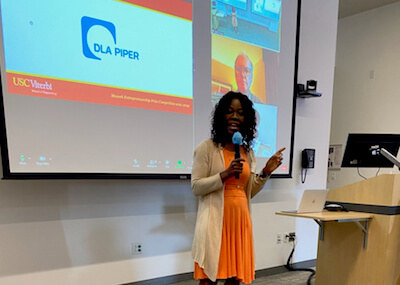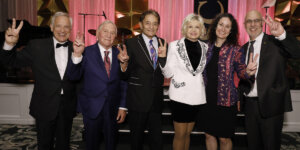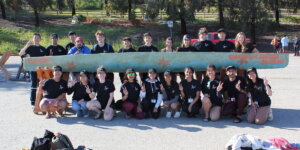
Playbook cofounders JD LeRoy and Skylar Thomas (Photo/Courtesy of JD LeRoy)
Virtual and augmented reality have the potential to revolutionize how we use and interact with technology for the better. With applications ranging from gaming and entertainment, to healthcare, retail, tourism, military training, education, and more, VR’s and AR’s possibilities are limitless.
However, designing for the immersive realm can be challenging, time-consuming and frustrating due to the complexity of the coding involved. Simply put, product designers all too often find that their two-dimensional skills don’t translate to immersive three-dimensional environments.
Members of the startup Playbook believe they have a solution. Ryan Mitchell, a senior at USC Viterbi majoring in computer science; and JD LeRoy and Skylar Thomas, both seniors in the USC Iovine and Young Academy, are building an intuitive, code-free design tool for AR and VR experiences.
On Wednesday, April 27, that vision was good enough for Playbook to win the 12th annual Maseeh Entrepreneurship Prize Competition, or MEPC, USC Viterbi’s premier business model competition. Team members also took home the grand prize of $50,000, money they plan to allocate toward developing a prototype and hiring employees.
“MEPC helped us refine our value proposition and communicate it to our various stakeholders,” Playbook CEO & cofounder LeRoy said.
Twelve teams participated in this year’s MEPC, which kicked-off in December. Each group received a $500 grant from USC Viterbi’s Office of Technology Innovation and Entrepreneurship for customer discovery, including conference and transportation fees.
The field was whittled down to six finalists on April 8. Teams competed for $50,000 in cash and more than $50,000 in free legal and business services offered by DLA Piper: $20,000 for the MEPC champion, $15,000 for second place, $10,000 for third and $5,000 for fourth place.
“MEPC is possibly the most important technology business model competition in Southern California,” USC Viterbi Dean Yannis C. Yortsos said.

MEPC Lead Instructor Denise McKenzie (Photo/Marc Ballon)
Added Denise McKenzie, MEPC lead instructor and an instructor for USC Viterbi and the NSF I-Corps Program: “The purpose of MEPC is to help engineers think like entrepreneurs and support student teams that wish to build companies. I think it’s important to support the notion of getting research and ideas out of the lab and into the market place so that society can benefit.”
MEPC was founded in 2010 thanks to a $1 million endowment from entrepreneur Fariborz Maseeh. To bring more business education to the contest, USC Viterbi partners with the Lloyd Greif Center for Entrepreneurial Studies at USC Marshall.
MEPC winners
The 2022 MEPC winners include:
2nd Place: NullaNet: Ultra-low-power AI for the intelligent edge
3rd Place: MicroMaterna: Reducing preventable childbirth-related deaths through the improved diagnosis of preeclampsia in low resource settings
4th Place: Apsy: Creating the next-gen AI to build affordable elegant custom apps
Inspecula: On a mission to end preventable cervical cancer death
Unithrifts: Creating a model of circular consumption at institutions of higher education with sustainability and affordability at the forefront
Over the past four months, the USC Viterbi student-led MEPC teams worked to perfect their business models, partnered with mentors who guided and advised them, and attended workshops on topics like customer discovery, intellectual property, and pitching to investors. The IN-LA Node of the National Science Foundation Innovation Corps (“I-Corps”) program provided the workshop curriculum.
The sessions were led by MEPC’s McKenzie; Hovig Tchalian, an assistant professor of clinical entrepreneurship at USC Marshall’s Lloyd Greif Center for Entrepreneurial Studies; and Rob Schoeben, an adjunct professor of entrepreneurship also at USC Marshall’s Lloyd Greif Center.
Tchalian said he was “most impressed by the ingenuity and specificity of some of the concepts the student teams presented.”
Schoeben said many of the student teams came to understand that “resilience, flexibility and iteration are keys to success. This is true in a competition like MEPC and even more true in the competitive entrepreneurial marketplace. It was rewarding to see teams come to understand how the game really works.”
MEPC participants said they benefitted greatly from the program, especially the workshops.
“They provided us with valuable information and a skill set about customer discovery, preparing a marketing pitch, and steps for setting up a company in a highly competitive marketplace,” said NullaNet’s Amirhossein Esmaili, Ph.D. ECE ’21.
Nick Enriquez, a junior biomedical engineering major and member of MicroMaterna said MEPC taught him and his teammates “to approach the same idea and situation from multiple perspectives, technical, financial, commercial. We have found great value in it.”
An illustrious history
Over the past decade, MEPC has launched several promising companies.
The 2021 MEPC winner, Watershield, created a bio-inspired water barrier, made of silicone-based polymers that adhere to the skin without the use of any chemical irritants, to provide cancer patients with a more comfortable, infection-proof shower experience.
The 2020 MEPC winner, GrayMatter Robotics, uses AI to create smart and rapidly deployable robotic assistants to automate high mix manufacturing tasks, improving quality of life for industrial workers, and increasing productivity. The 2019 victor, AIRBOND, now called Apogee Composites, designed a cheaper, more efficient way to produce carbon fiber composite materials for the aviation and other industries.
AesculaTech, the 2016 runner-up, develops and manufactures a platform of temperature-responsive smart materials for use in medical devices, including the treatment of dry eye. After MEPC, AesculaTech received an invitation from Y Combinator, the famed Bay Area business incubator.
Second Spectrum, the 2013 winner, analyzes big data for insights into sports performance, such as what constitutes good defense and offense in basketball. Currently, NBA teams receive Second Spectrum optical tracking data, which powers next-generation analytics.
Playbook’s chief technology officer Thomas said he hopes that his burgeoning company can one day join the illustrious ranks of successful MEPC alumni.
“We’re going fulltime with this,” said Thomas, adding that Playbook expects to close its first round of seed funding sometime this month. “We want to become the go-to design tool for augmented and virtual reality.”
Published on May 5th, 2022
Last updated on May 5th, 2022









